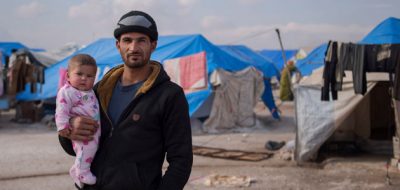
By Cian Molloy - 08 April, 2019

A father and child in a United Nations-run camp for Syrian refugees.
The World Health Organisation (WHO) launched a campaign yesterday for World Health Day, calling for health care for all.
WHO point out that about half the world’s population do not have access to essential health services, including health promotion and disease prevention services, treatment, rehabilitation and palliative care.
The organisation estimates that some 100 million people across the globe are being pushed into extreme poverty (defined as having only US$1.90 or less to live on each day) because of the burden of paying for the health care needs of relatives or loved ones.
All United Nations member states have agreed to work towards achieving universal health care (UHC) by 2030, as part of the sustainable development goals agreed upon in 2015.
WHO director general Dr Tedros Adhanom Ghebreyesus said: “Millions of women give birth without help from a skilled attendant, millions of children miss out on vaccinations against killer diseases, and millions suffer and die because they can’t get treatment for HIV, TB, and malaria. In 2019, this is simply unacceptable.”
Because of inequalities in healthcare provision, there is an 18.1-year gap in life expectancy between those living in the world’s poorest countries and those who live in the world’s richest countries
Sr Carol Breslin of the Medical Missionaries of Mary (MMM) points out that UHC doesn’t mean providing free coverage for all possible medical interventions.
“No country can provide all services free of charge on a sustainable basis,” she said. “In countries where health services have traditionally been accessible and affordable, governments are finding it increasingly difficult to respond to growing health needs. WHO suggests that pooling funds from compulsory funding sources (such as mandatory insurance contributions) can spread the financial risks of illness.
“It believes that investments in quality primary health care (PHC) are key to achieving universal health coverage. Efficient and cost effective, the PHC approach is centred on the needs and circumstances of individuals, families and communities.
“It is not just about treating a set of specific diseases, but also addresses the broader determinants of health: social, economic, environmental, as well as people’s characteristics and behaviours. It emphasises the participation of all concerned in developing policies that promote their health and well-being.
“Good health allows children to learn and adults to earn, helps people escape from poverty, and provides the basis for long-term economic development,” Sr Carol said.